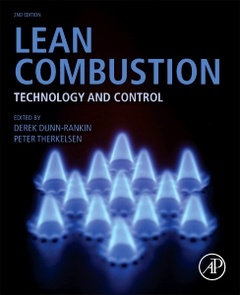Lean Combustion (2nd Ed.) Technology and Control
Coordonnateurs : Dunn-Rankin Derek, Therkelsen Peter

Lean Combustion: Technology and Control, Second Edition outlines and explains the latest advances in lean combustion technology and systems. Combustion under sufficiently fuel-lean conditions can have the desirable attributes of high efficiency and low emissions. The book offers readers both the fundamentals and latest developments in how lean burn (broadly defined) can increase fuel economy and decrease emissions, while still achieving desired power output and performance. This volume brings together research and design of lean combustion systems across the technology spectrum in order to explore the state-of-the-art in lean combustion.
Readers will learn about advances in the understanding of ultra-lean fuel mixtures and how new types of burners and approaches to managing heat flow can reduce problems often found with lean combustion (such as slow, difficult ignition and frequent flame extinction).
This book offers abundant references and examples of real-world applications. New to this edition are significantly revised chapters on IC engines and stability/oscillations, and new case studies and examples. Written by a team of experts, this contributed reference book aims to teach its reader to maximize efficiency and minimize both economic and environmental costs.
1. Introduction and Perspectives 2. Fundamentals of Lean Combustion 3. Highly Preheated Lean Combustion 4. Lean-Burn Internal Combustion Engines 5. Lean Combustion in Gas Turbines 6. Lean Premixed Burners 7. Combustion Instabilities in Lean Premixed Systems
Dr. Peter Therkelsen is a Research Scientist in the Energy Technologies Area at the Lawrence Berkeley National Laboratory, focusing on the development and deployment of responsible energy efficiency and generation technologies. Dr. Therkelsen leads the LBNL Combustion Laboratory where he studies and develops high efficiency, fuel flexible, and low emission installed and portable heat and power systems. His current work is focused on developing lean combustion technologies that encourage the accelerated utilization of biofuels while meeting thermal demands and emissions regulations. Additionally, Dr. Therkelsen co-manages the LBNL Industrial Systems Team. In this role he conducts data driven studies of the costs and benefits of industrial energy efficiency measures and energy management systems and serves as a delegate of the United States at International Standards Organization meetings for energy management and savings.
- Presents a comprehensive collection of lean burn technology across potential applications, allowing readers to compare and contrast similarities and differences
- Provides an extensive update on IC engines including compression ignition (diesel), spark ignition, and homogeneous charge compression ignition (HCCI)
- Includes an extensive revision to the Stability/Oscillations chapter
- Includes use of alternative fuels such as biogas and hydrogen for relevant technologies
- Covers new developments in lean combustion using high levels of pre-heat and heat recirculating burners, as well as the active control of lean combustion instabilities
Date de parution : 07-2016
Ouvrage de 280 p.
19x23.3 cm
Thèmes de Lean Combustion :
Mots-clés :
Advanced manufacturing; Air quality; Air staging; Autoignition; Autoignitive burning; Burning velocities; Combustion instability control; Combustion instability; Combustor acoustics; Compression-ignition engines; control; Detonation; Diffusion flames; Dilute combustion; Direct injection; Distributed combustion; Efficiency; Elementary process; Emission reduction; Emission regulations; Energy conversion efficiency; Engine emissions; Engine fuel economy; Engine knock; Engine performance; Entropy coupling; Excitation time; External control; Filtrational combustion; Flame extinction; Flame heat release rate; Flame instabilities; Flame stability; Flame stabilization methods; Flame stabilization; Flame stretch rate; Flameless combustion; Fuel flexibility; Fuel lean combustion; Fuel staging; Fuel variability effects; Greenhouse gas reduction; Heating systems; Heterogeneous; High preheat; High temperature air combustion; Homogeneous mixtures; Homogeneous-charge combustion engines; Hydrodynamic instability; Hydrogen; Ignition delay time; Instability triggering; Internal combustion engine; Internal recirculation; Lean burn; Lean combustion history; Lean combustion; Lean premixed; Microwave-assisted spark ignition; MILD combustion; Mixing layer; Mixture coupling; Mobile sources; Natural gas; NOx; Rayleigh Index; Reactive fuels; reduction; Renewable fuels; Spark-ignition engines; Stationary sources; Stratification; Technology drivers; Thermoacoustics; Turbulence; Turbulent flame speed; Velocity coupling; Well-stirred reactor



